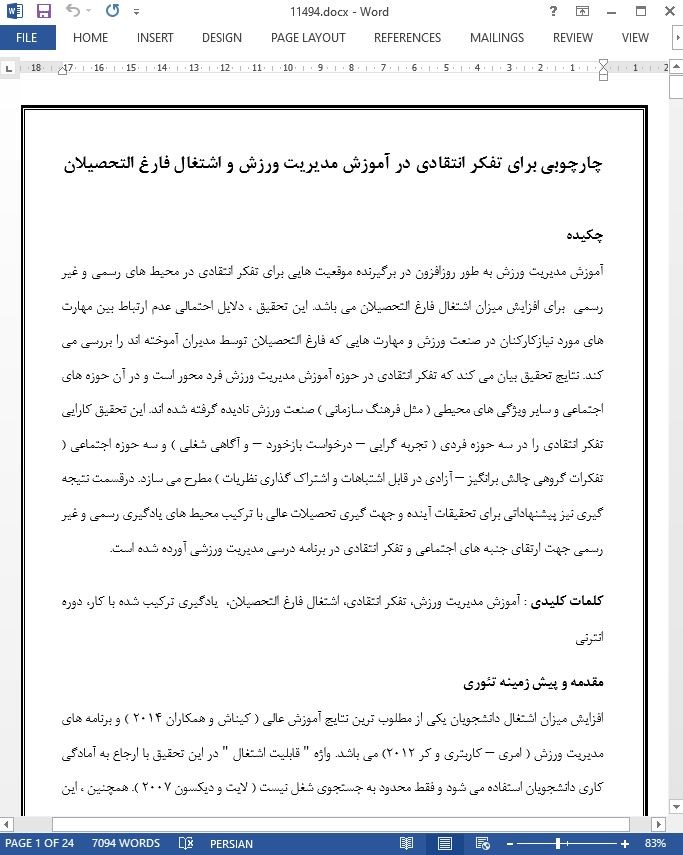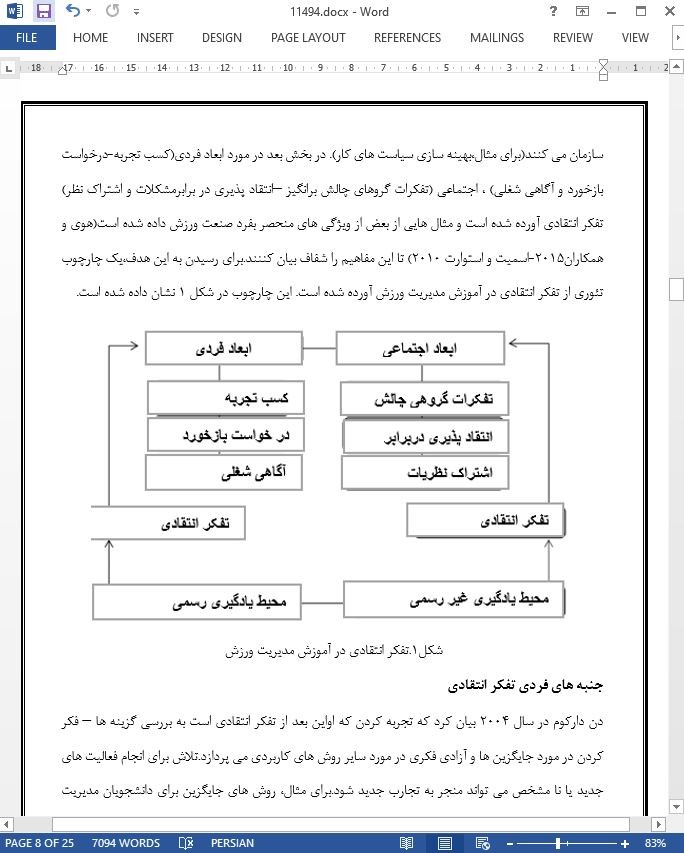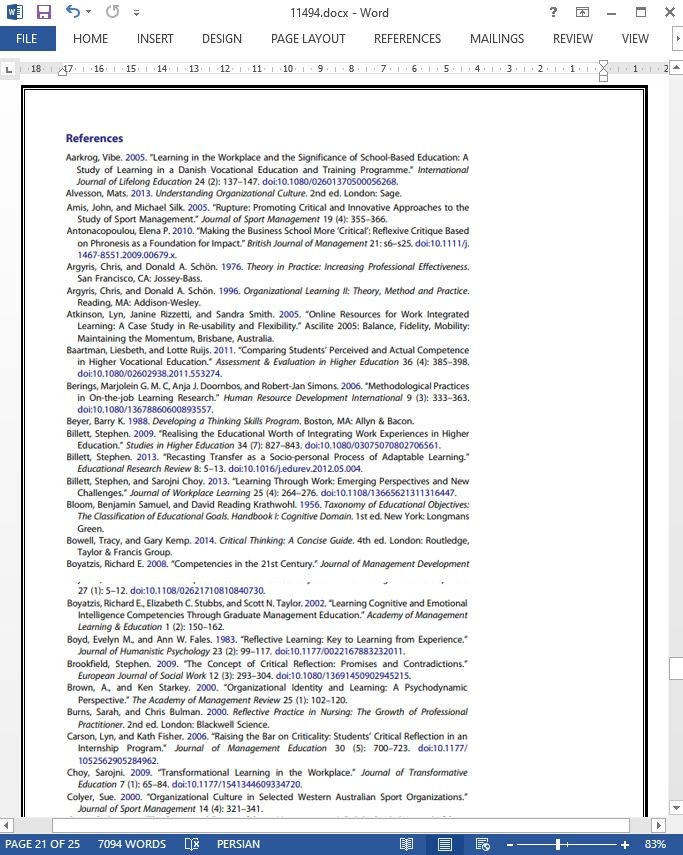
چارچوبی برای تفکر انتقادی در آموزش مدیریت ورزش و اشتغال فارغ التحصیلان
چکیده
آموزش مدیریت ورزش به طور روزافزون در برگیرنده موقعیت هایی برای تفکر انتقادی در محیط های رسمی و غیر رسمی برای افزایش میزان اشتغال فارغ التحصیلان می باشد. این تحقیق ، دلایل احتمالی عدم ارتباط بین مهارت های مورد نیازکارکنان در صنعت ورزش و مهارت هایی که فارغ التحصیلان توسط مدیران آموخته اند را بررسی می کند. نتایج تحقیق بیان می کند که تفکر انتقادی در حوزه آموزش مدیریت ورزش فرد محور است و در آن حوزه های اجتماعی و سایر ویژگی های محیطی ( مثل فرهنگ سازمانی ) صنعت ورزش نادیده گرفته شده اند. این تحقیق کارایی تفکر انتقادی را در سه حوزه فردی ( تجربه گرایی – درخواست بازخورد – و آگاهی شغلی ) و سه حوزه اجتماعی ( تفکرات گروهی چالش برانگیز – آزادی در قابل اشتباهات و اشتراک گذاری نظریات ) مطرح می سازد. درقسمت نتیجه گیری نیز پیشنهاداتی برای تحقیقات آینده و جهت گیری تحصیلات عالی با ترکیب محیط های یادگیری رسمی و غیر رسمی جهت ارتقای جنبه های اجتماعی و تفکر انتقادی در برنامه درسی مدیریت ورزشی آورده شده است.
تحقیقات آینده
با اشاره به وجود شواهد زیاد در مورد مزایای توسعه ابعاد اجتماعی تفکر انتقادی، و بر اساس تحلیل انجام شده در این تحقیق، مزایای این پیشرفت ها مسیر را برای تحقیقات آینده هموار می سازند و امکان بررسی طراحی برنامه های درسی و تغییر در جهت گیری های آموزش عالی را فراهم می آورد و فارغ التحصیلان آموزش مدیریت ورزش را قادر می سازد تا انتقادی تر باشند و میزان اشتغال را افزایش دهند. بخصوص اینکه،تحقیقات آینده باید چشم اندازها- تجارب و توانایی های تفکر انتقادی منعکس کننده محیط های WIL را بررسی کنند و شیوه های افزایش ارزش سازمان های میزبان در طولWILرا مورد بررسی قرار دهند. این اطلاعات می توانند طراحی برنامه های درسی را آگاهانه کنند و کسب تجربه مرتبط با ارتقای ابعاد اجتماعی تفکر انتقادی را تسهیل کنند. همچنین، تحقیقات آینده در مورد نقش، ارزش و پیشرفت آموزش مدیریت ورزش باید چشم اندازهای ناظران ، محصلان و سازمان های میزبانWIL را در بربگیرند. در نظر گرفتن چشم اندازهای تمام سهامداران منجر به کسب اطلاعات بیشتر در مورد مسائل مربوط به استفاده از SKA در موقعیت های سازمانی و توسط دانشجویان رشته مدیریت می شود.
ABSTRACT
Sport management education is increasingly including opportunities for critical reflection in both formal and informal learning environments to improve graduate employability. This paper outlines potential reasons why there is disconnect between the skills employers want in the sport industry and the skills that sport management programmes equip graduates with. The findings of this review suggest that critical reflection in tertiary sport management education is individually oriented, and neglects the social dimensions and other contextual aspects (e.g. organizational culture) of the sport industry. This paper proposes an operationalization of critical reflection into three individual dimensions (experimentation, asking for feedback, and career awareness) and three social dimensions (challenging group-think, openness about mistakes, and sharing ideas). The paper concludes with suggestions for further research and higher education policy direction that combines formal and informal learning environments in enhancing the social aspects of critical reflection in sport management curricula.
Future research and conclusion
Given the wealth of evidence of the benefits of developing the social dimensions of critical reflection, and based on the analysis in this paper, these development benefits offer directions for future research and investigations into the ways that curriculum design and changes to higher education policy direction can enable sport management graduates to become more critically reflective, thereby increasing their employability. Specifically, further research should investigate students’ views, experiences, and abilities to critically reflect within WIL environments and it should investigate the ways in which students can add value to the host organizations during WIL. This information could inform curriculum design to foster experiences that facilitate the development of the social dimensions of critical reflection. Further to this, future research on the role, value and advancement of critical reflection in sport management education should be inclusive of the perspectives of WIL supervisors, educators, and host organizations. Including the views of all stakeholders would result in greater insights on issues surrounding the application of SKAs in organizational settings by sport management students.
چکیده
مقدمه و پیش زمینه تئوری
تفکر انتقادی و تفکر انتقادی در مدیریت ورزشی
اجرایی شدن تفکر انتقادی در ابعاد فردی و اجتماعی
جنبه های فردی تفکر انتقادی
ابعاد اجتماعی تفکر تفکری
یادگیری در محیط های رسمی و غیر رسمی
بحث
ABSTRACT
Introduction and theoretical background
Critical thinking and critical reflection in sport management
Operationalization of critical reflection into individual and social dimensions
Individual dimensions of critical reflection
Social dimensions of critical reflection
Learning in formal and informal environments
Discussion
- اصل مقاله انگلیسی با فرمت ورد (word) با قابلیت ویرایش
- ترجمه فارسی مقاله با فرمت ورد (word) با قابلیت ویرایش، بدون آرم سایت ای ترجمه
- ترجمه فارسی مقاله با فرمت pdf، بدون آرم سایت ای ترجمه



